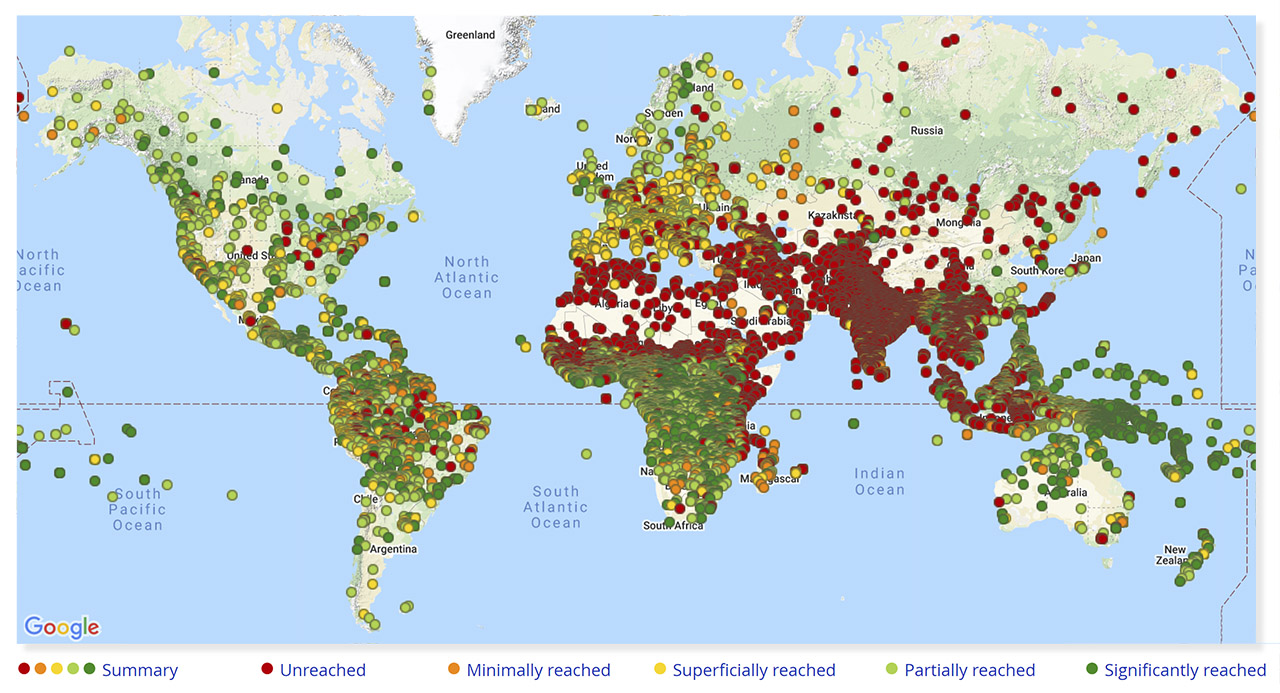When Jesus commanded His followers to “make disciples of all nations” in Matthew 28:19, He was not referring to political nations. The word Jesus used for nations in Greek is “ethne,” from which we get the English word “ethnic.” Jesus commanded us to make disciples from every ethnic people group. In Matthew 24:14, He said, "And this Gospel will be proclaimed throughout the whole world as a testimony to all nations, and then the end will come." Until we accomplish this, the task is unfinished.
Reach Beyond is committed to helping the global Church to make disciples among unreached people groups (UPGs). These are cultures and locations where Jesus Christ is largely unknown, and the church is relatively insufficient to make Him known in its broader population without outside help.
According to Joshua Project, there are still 7,000 UPGs, making up over 40 percent of the world’s population. The map below shows where the unreached are primarily located, but we also know we have the opportunity to reach displaced people groups in our own countries.
We want unreached people everywhere to hear about Jesus, see Him in action and learn how to follow Him. Because of our strengths in media, Reach Beyond has prayerfully decided to prioritize the 1900 largest unreached people groups of 100,000 or more in population.

Weekly UPG Prayer Focus
Country: Bangladesh | Population: 12,535,000 | Language: Sylheti | Main Religion: Islam | Evangelical: 0.0-0.1%
The Sylhet are Muslims from Bangladesh’s Sylhet region and Northeast India who combine Muslim and Hindu wedding customs. Although Islam does not recognize castes, Sylheti Muslims practice a system of social division. Every year, the Sylhet community celebrates certain Islamic holidays. They give their children money, and the men offer special Islamic prayers. They visit relatives later in the day and cook traditional food. As Muslims, they usually hear at an early age that the Bible is filled with inaccuracies and the Koran is flawless. There is much social pressure to remain within the Islamic fold. It is very difficult to break into the Sylhet community. Believers must spend much time in fervent prayer before sending someone to tell them about the one and only Savior. Pray that God would open their hearts to hearing the word of the Lord. Ask God to speak to their hearts and pray that they would respond and choose to joyfully follow Jesus.
Country: Iran | Population: 1,419,000 | Language: Mazanderani | Main Religion: Islam | Evangelical: 0.1-2.0%
The Mazanderani live in northern Iran along the Caspian Sea coast, a region of marshy plains that give way to highlands farther inland. The region has been invaded multiple times throughout the centuries. They are an ethnic mix of Turkic tribes, Armenians, and Russian immigrants. Although closely connected to Farsi, the Mazandarani language has never been put into written form, creating a roadblock to cultural and spiritual growth. Many Mazanderani raise crops and cattle. They are famous for their Arabian horses. Pray for doors to open for Christian teachers to serve this people group. Ask God to open the hearts of Iran’s government leaders to allow access to the Gospel. Pray for the completion of an audio Mazandarani Bible.
Country: Russia | Population: 564,000 | Language: Kumyk | Main Religion: Islam | Evangelical: 0.0-0.1%
The Kumyk are one of only two Turkic-language people groups in Dagestan (southern Russia). They farm, tend vineyards, and raise cattle on the fertile Kumyk Plateau by the Caspian Sea. They are a proud, respected people who once held major political influence in the region. Their art, dance, folk music, and weddings present a unique fusion of cultural and religious traditions. Once a Christian people, the Kumyk have been Sunni Muslims since the 9th century. They rarely marry outsiders, and they see large families as a blessing from Allah. Islam is integral to Kumyk identity, although they tend to mix folk religion into their practice. They see Christianity as a Russian religion, which makes it unsafe for the tiny Kumyk church to exist publicly. Pray for boldness and safety for Kumyk believers. Ask God to open the hearts of Kumyk elders and leaders to hear and receive the Gospel.
Country: Mali | Population: 1,560,000 | Language: Fulfulde, Maasina | Main Religion: Islam | Evangelical: 0.0-0.1%
The Fula Maasina are much like the Fulani peoples found throughout West Africa. They are largely agricultural-based, raising cattle along with sheep and goats. They farm crops like millet, rice, and peanuts. Fula Maasina villages or communities are typically scattered but include a center court, a mosque, and often an Islamic school. They are very devoted to Islam and view it as part of their identity. The Fula Maasina are very resistant to Christianity as they fear that it will divide their families. Pray that God would open the eyes and hearts of family and village leaders so they would see the truth. Pray for more believers and workers to live among them. Pray that the Fula Maasina would recognize Jesus as their Savior and that they would choose to follow Him.